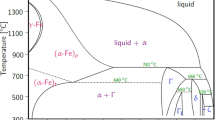Cemented carbide (WC-Co) samples with dimensions of 5 20 mm 3 were ground using a reciprocating table surface grinding machine. Direct electrical current with densities of 0–120 A cm _2 were injected along the length of the sample during grinding. The hardness, structure, and composition of the processed surfaces were examined using Vickers indentation, profilometry, metallographic optical microscopy and scanning electron microscopy (SEM), with scattered electrons (SE), backscattered electrons (BSE) and energy dispersive specroscopy (EDS). The surface roughness increased up to a factor of 2.6 at J = 60 A cm _2 at a cutting depth of 0.06 mm, and the microhardness increased up to 28% with J = 120 A cm _2 at a depth of cut 0.06 mm, in comparison with samples ground without injected current. The atomic concentration ratio WC/Co increased by a factor of 2 at the surface and decreased by a factor of 5 at a depth of 3 _m, when the injected current density was 60 A cm _2 .
Similar content being viewed by others
Author information
Authors and Affiliations
Rights and permissions
About this article
Cite this article
Parkansky, N., Rapoport, L., Alterkop, B. et al. Effect of Transverse Current Injection on the Grinding of Cemented Carbide. Int J Adv Manuf Technol 18, 242–246 (2001). https://doi.org/10.1007/s001700170064
Issue Date:
DOI: https://doi.org/10.1007/s001700170064




